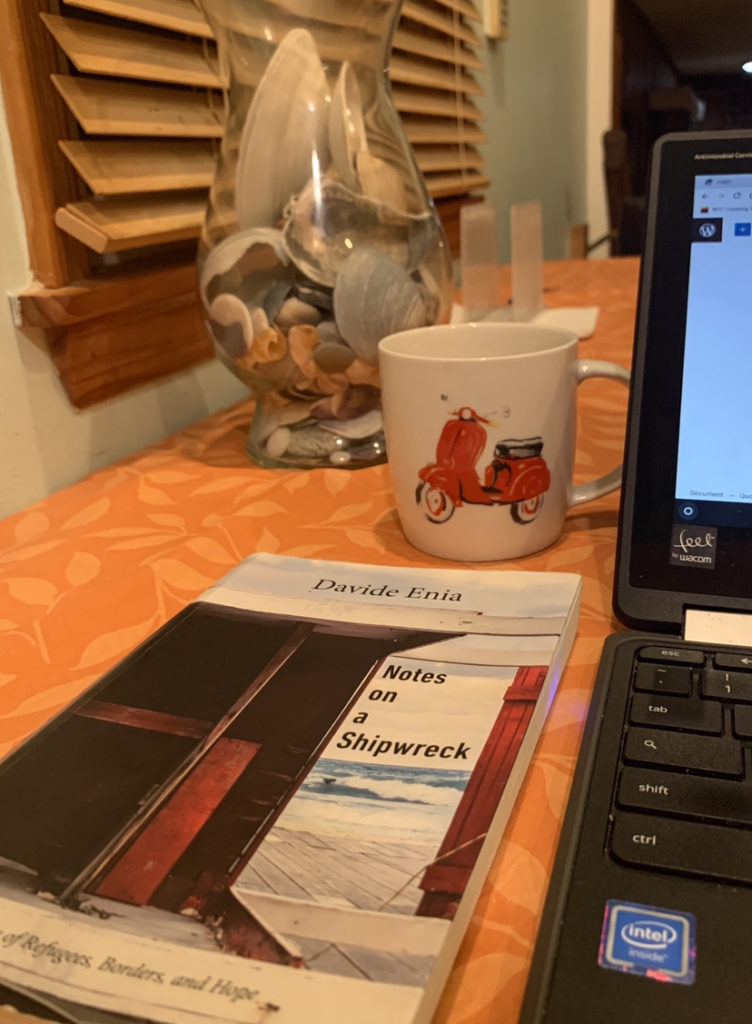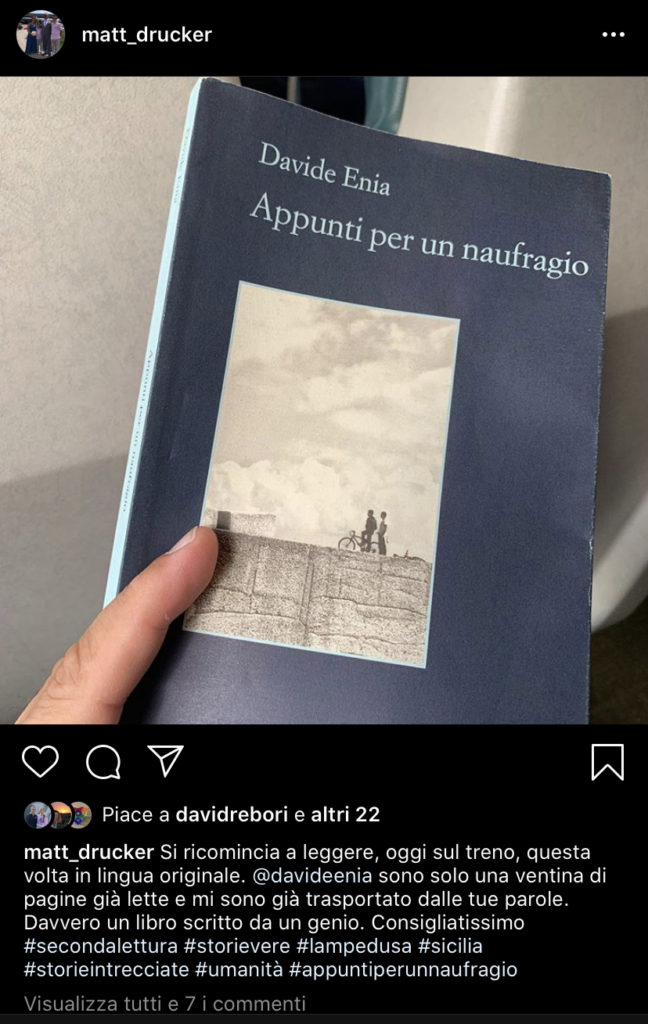I have read a lot of books. As a teacher, I savor my summers because I have the luxury to do one of my favorite things: sit by my pool and read. There are times when I am so engrossed in a great book that I can spend an entire day in the same chair, poolside.
Last year, I made my way to a favorite bookstore, Book Revue (in Huntington, NY, for all you locals). When I’m in a bookstore, I like to take my time and look around. I don’t want to miss anything and so I will look in all my favorite sections for anything that catches my eye. Usually, too many books will catch my eye and I’ll have to narrow it down so my wife doesn’t try to sell me on libraries. In any case, I saw a name on this book: Davide Enia. No matter where I go, something Italian will catch my eye, even an author’s name!

I picked up the book, Notes on a Shipwreck. I read the jacket and there was no way I wasn’t going to buy this book. Not only is the author Italian but it takes place in Italy and is non-fiction. To be clear, non-fiction is my genre of choice.
Very often when you think of Italians and immigration, you are transported back to the beginning of the twentieth century or post WWII, when waves of Italians were leaving Italy for a better life. They were flocking to the Americas and even to Australia for the promise of a better future for their families and for themselves. Looking back, many of us are proud of our ancestors who made the ultimate sacrifice and rightfully so. Because of their bravery and determination, the generations that followed have benefited as have our communities. I think you’d be hard pressed to find a town in America without the influence of Italian food (thankfully!).
Fast forward to the much more recent times of the 2000s. Italians aren’t leaving Italy anymore like they used to. Yes, some are leaving for work or for the spirit of adventure but it is not for the same reasons as once upon a time. In fact, there are many people who are trying to move to Italy because of everything that Italy has become synonymous with: high fashion, amazing food and La dolce vita. Thanks to the recent interest in genealogy and getting in touch with our roots, it has become a dream for many to return to their ancestral towns, maybe gain dual citizenship and even purchase property.
While it seems that Italy is idyllic for some, it has also become a gateway for refugees fleeing their war-torn homelands. In a sense, Italy has had to assume a role that America did years ago. Given its strategic location in the Mediterranean, many refugees are boarding boats risking their lives in less than human conditions in order to reach Italy. Many plan to use Italy as an interim stop til they can get to a more economically stable country in Europe, like Germany. But Italy is their first stop and many end up remaining there, if they survive their trip.
I had heard about these boats in the Italian news many times and here I had in my hand a book about this very topic. At first, I thought that it might be depressing to read about these poor souls willing to do anything to escape the atrocities of their countries. However, as I read more and more, I found that although the landings of these boats in Lampedusa presented a heart-wrenching scene, I felt hopeful. I felt the good in humanity.
The book reads like a memoir and Davide Enia is incredible at taking the stories and relationships of his characters and weaving them together as if the whole story could have been invented and scripted to perfection. Each person plays an important role in the story and although some may never actually cross paths with others, they all are perfectly integral.
Another striking element of this book is that he is able to make you see through the eyes of his characters a range of emotions, from fear to the desire to help even when it might not be politically correct, and gives his reader food for thought. Should we help people arriving illegally into a country? Are all people really created equally? Is a small country like Italy economically able to help? The book really gives you insight into each point of view.
Another great aspect of this book is that although it is translated from the Italian, there is a lot if Sicilian dialect used. Of course it is then translated into English for his English speaking readers but even in the Italian version (which I bought from Amazon before I was halfway through the English version), the Sicilian dialect is important because oftentimes, dialect is something intimate between its speakers. It is a bond between them. It certainly is a nice touch of authenticity in this book.
I usually read pretty quickly, especially if it has me enveloped in the story. I was about thirty or so pages from the end and I started to feel like I wasn’t ready for this to end. I put the book on my nightstand and it sat there for a almost a week before I picked it up and finished it. I can honestly say that even though I have loved books that I have read, I have never wanted to read a book again and right after I finished it. Luckily, I had already received the Italian version in the mail.

I have recommended this book to everyone who will listen to me. I have shared it with an English teacher in my school and she loved it so much she ordered enough copies for a class set to read with her students. I had a Sicilian exchange student in my class this past year, and I lent it to her to read in English because she could read about something close to her life and practice her English (which was already pretty amazing).
All of this because of my eye spotting an Italian name.
“Noi siamo singole gocce, ma tante gocce possono creare un oceano.” “We are single drops, but lots of drops can create an ocean.”
Doctor Pietro Bartolo
